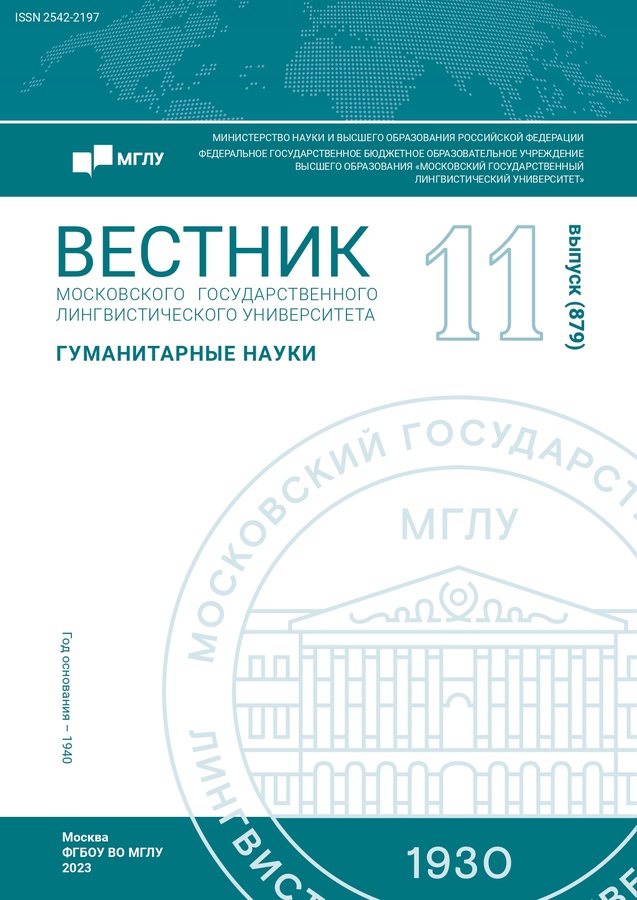Comparative Analysis of the Approaches to Euphemisms’ Research (based on Korean and Turkish)
- Autores: Zharova E.M.1
-
Afiliações:
- Moscow State Linguistic University
- Edição: Nº 11 (879) (2023)
- Páginas: 17-22
- Seção: Linguistics
- URL: https://journal-vniispk.ru/2542-2197/article/view/327932
- ID: 327932
Citar
Texto integral
Resumo
Language studying is impossible without studying cultural values of its native-speakers. A lot of linguists study euphemisms but there is neither their universal definition nor their specifications and classifications. The article is devoted to a comparative analysis of the approaches to euphemisms’ research in Korean and Turkish. The research material comprises articles of social and political topics in Korean and Turkish.
Palavras-chave
Sobre autores
Ekaterina Zharova
Moscow State Linguistic University
Autor responsável pela correspondência
Email: katzhara@gmail.com
PhD Student, Department of General and Comparative linguistics Moscow State Linguistic University
RússiaBibliografia
- Shafigullina, L., Daminova, E., Tarasova, V. (2016). Politicheskiye evfemizmi v sredstvah massovoi informatsii (na materiale amerikanskih I turetskih pechatnih izdanii nachala XXI veka) = Political euphemisms in mass media (on the material of the American and Turkish printed editions of the beginning of the 21st century). (In Russ.)
- Akhmanova, O. S. (1969). Slovar lingvisticheskih terminov = A dictionary of linguistic terms. Moscow: Sovetskaya Entsiklopediya. (In Russ.)
- Galperin, I. R. (1981). Ocherki po stilistike angliyskogo yazyika = Essays of English stylistics. Moscow: Vyisshaya shkola. (In Russ.)
- 양정 (2018). 한국어 완곡표현 연구. = Yang Jeong. (2018). Euphemism study in Korean. Seul: Pakmunsa.
- 강병창, 안혁. 완곡어법을 중심으로. 수사학 연구 제18호. 한국수사학회. 2013. = Kang Pyeongchang. (2013). An Hyeok. Euphemism study. Seul: Declamation studies, 18.
- Pokholkova, E. (2016). Political correctness as a part of language policy in the mass media in South Korea. In New Trends in Korean Studies : Proceedings of the 15th CEESOK International Conference on Korean Studies. Poznan: Adam Mickiewicz University.
- Korotkikh, Zh. (1999). Nekotorye problemy perevoda neologizmov-jevfemizmov = Challenges of translating neological euphemisms. In Aktual'nye problemy sopostavitelnogo yazikoznaniya i mezkulturnoi kommunikatsii : Proceedings of an international conference. Ufa: Bashkir State University. (In Russ.)
- Bilginer, H. (2001). Batı dillerinde ve Türkçede güzel adlandırmalar. Türk Dili (pp. 441–445). Ekim.
- Güngör, A. (2006). Tabu-Örtmece (Euphemism) Sözler Üzerine. Atatürk Üniversitesi Türkiyat Araştırmaları Enstitüsü Dergisi, Erzurum.
- Аksan, D. (1990). Her Yönüyle Dil III. Ankarа: TDK Yay.
- Panin, V. (2004). Politicheskaya korrectnost kak kulturno-povedencheskaya i yazikovaya kategoriya = Political correctness as cultural, behavioural and linguistic category: abstract of PhD in Philology. Tumen. (In Russ.)
- Kiprskaya, E. (2005). Politicheskiye evfemizmi kak sredstvo kamuflirovaniya deystvitelnosti v SMI (na primere konflikta v Irake 2003–2004) = Political euphemisms as a tool of camouflaging reality in mass media (on the example of Irak’s conflict in 2003–2004): abstract of PhD in Philology. Izhevsk. (In Russ.)
- Çelik, C. (2011). Türkiye Türkçesinde Örtmece ve Tabu Kelimeler. Yayımlanmamış Yüksek Lisans Tezi. Gazimağusa Kuzey Kıbrıs. (In Turkish)
- Chub, A., Zharova, E. (2022). Challenge of translating Korean euphemisms into Russian. Vestnik of Moscow State Linguistic University. Humanities, 10(865), 98–104. (In Russ.)
- Lee, H. (1918). Nepryamoy diskurs koreyskogo yazyika kak perevodcheskaya problema = Indirect discourse of Korean as a translation challenge. Moscow: Moscow State Linguistic University. (In Russ.)
- Mazur, Y. N. (2001). Grammatika koreyskogo yazyika = Grammar of Korean. Moscow: Muravey-Gaid publishing house. (In Russ.)
Arquivos suplementares










